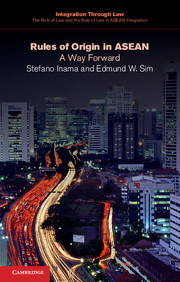Arndt, S. and Kierzkowski, H., Fragmentation: New Production Patterns in the World Economy (Oxford University Press, 2001).
European Commission, Impact Assessment on Rules of Origin for the Generalized System of Preference (GSP) (2007).
Ganeshan, W. and Kawai, M., Asia's Free Trade Agreements: How Is Business Responding (Asian Development Bank, 2011).
Hayakawa, K., Hiratsuka, D., Shiino, S. and Sukegama, S., Who Uses Free Trade Agreements? (JETRO, 2007).
Hiratsuka, D., Isono, I., Sato, H. and Umezaki, S., “Escaping from FTA Trap and Spaghetti Bowl Problem in East Asia: An Insight from the Enterprise Survey in Japan” in Soesastro, H. (ed.), Deepening Economic Integration in East Asia: The ASEAN Economic Community and Beyond (ERIA, 2007), pp. 304–327.
Inama, S., Rules of Origin in International Trade (Cambridge University Press, 2009).
Inama, S., “The Reform of the EC GSP Rules of Origin: Per Aspera Ad Astra?” Journal of World Trade, 45 (2011).
James, W., “Rules of Origin in Emerging Asia-Pacific Preferential Trade Agreements: Will PTAs Promote Trade and Development,” Asia-Pacific Research and Training Network on Trade Working Paper Series, 19 (2006).
Kimura, F., “International Production and Distribution Networks in East Asia: Eighteen Facts, Mechanics, and Policy Implication,” Asian Economic Policy Review, 1 (2006), 326–344.
Medalla, E. M. and Balboa, J., ASEAN Rules of Origin: Lessons and Recommendations for Best Practice (PIDS, 2009).
Takahashi, K. and Urata, S., “On the Use of FTAs by Japanese Firms,” RIETI Discussion Paper, 08-E-002 (2008).
Takahashi, K. and Urata, S., “On the Use of FTAs by Japanese Firms: Further Evidence,” RIETI Discussion Paper, 09-E-028 (2009).
UNCTAD, Market Access for Least Developed Countries (2001).
UNCTAD, Trade Preferences for LDCs: An Early Assessment of Benefits and Possible Improvements (2003).
UNCTAD, Trade Is Better Than Aid to Aid for Trade (2008).



